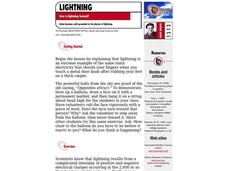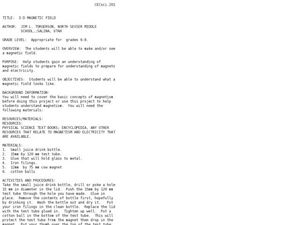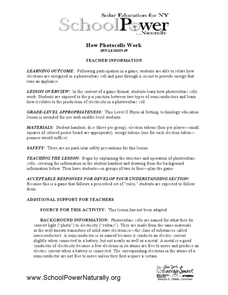Curated OER
Wire Maze
Pupils investigate what causes electrical circuits to work. They construct a wire circuit and pass a paperclip through the maze, trying not to touch the wire, and answer discussion questions.
Curated OER
Electromagnets
Students are introduced to the relationship between electricity and magnetism. Using a compass, they observe and record the effects of placing the object near magnetic fields and electric currents. They also experiment using a steel and...
Curated OER
Let There Be Light
Fifth graders explore electricity. For this electricity lesson, 5th graders experiment with open and closed circuits. Students determine how to properly connect a battery and bulb to illuminate the bulb.
Curated OER
Fossil Fuels, Who Needs Them
Ninth graders explore how electricity is created and distributed through alternative production methods. Students participate in hands-on activities, research, lecture based instruction, and CD ROM resources.
Curated OER
Let's Light Up a Light Bulb!
Third graders investigate the concept of how electricity works in the lighting of a light bulb. They construct a circuit in order to follow the path of electricity and test how it can travel in a wire system. Then the light bulb is lit...
Curated OER
You Light Up My House
Students explore renewable and nonrenewable resources. In this electricity lesson, students consider way to reduce the energy that they use as they chart and analyze their own electricity usage.
Curated OER
A Bright Idea
Pupils establish an understanding of electricity and then demonstate that understanding by creating a basic experiment involving a lemon battery. They reflect on the importance of electricity.
Curated OER
Cling On's
Students define the term static electricity and how to it. In this electricity lesson students design and implement an experiment to show how static electricity affects their daily lives.
Curated OER
Windmill activity
Students explore how to build an efficient windmill design by taking into account how the lift and drag caused by the movement of wind can be used to make the blades of the turbine move. Through their readings, hypothesis and by trail...
Curated OER
Lightning
Students investigate lightning. In this lightning lesson, students demonstrate how static electricity is in the air by observing how a balloon reacts to a charge.
Curated OER
Opposites Attract
Young scholars examine the properties of magnets and static electricity. They participate in experiments that demonstrate the behaviors of charged particles, and record their data on a worksheet.
Curated OER
3-D Magnetic Field
Young scholars create a magnetic field. In this investigative lesson students design their own magnetic field so that they can see how magnetism and electricity work.
Curated OER
MagLev Train System Activity
Young scholars are able to analyze practices that affect the use, availabiltiy, and management of natural resources. They are able to show that the forces of friction retards motion. Students investigate electricity and magnetism as...
Curated OER
Light the Bulb
Students explore electricity. In this power experiment lesson, students determine what is required for lighting a bulb. Students develop an understanding of open and closed circuits, and how energy is formed
Curated OER
Parallel Circuits
Students investigate the way an electrical circuit works. In this physics instructional activity, students use voltmeters and ammeters to measure voltage. They construct a circuit using provided circuit kits.
Curated OER
Comparing Light Bulbs
Fifth graders compare filaments in different light bulbs. In this science lesson, 5th graders view the filaments of light bulbs under a microscope.
Curated OER
Coin Battery
Students explore basic principles of electricity and create their own battery.
Curated OER
Making An Anemometer
Students discover how to capture the speed of wind. In this science activity instructional activity, students gather materials and follow procedures to create an anemometer to measure wind speed.
Virginia Department of Education
Metals, Nonmetals, and Metalloids
How can one easily classify metals, nonmetals, and metalloids? Pupils answer this question as they experiment with unknown substances and perform tests on conductivity, brittleness, and malleability to determine which unknown belongs in...
University of Texas
Free-Body Diagram
Preparing for an AP test is about more than bubble sheets and memorization. The two activities in this resource require a direct application of skills learned throughout an AP Physics course.
Virginia Department of Education
Mystery Iron Ions
Young chemists perform an experiment to determine if a compound is iron (II) chloride or iron (III) chloride. Then they determine the formula, balance the equation, and answer analysis questions.
Virginia Department of Education
Properties of Compounds and Chemical Formulas
Young chemists have unknown compounds they need to sort. Performing three different tests on each, the chemical behaviors they observe become the basis for data analysis.
Curated OER
Castaway or Survivor
What a clever idea! Chemistry learners imagine themselves deserted on an island with a radio, but no batteries. They also have a few odds and ends in their pockets and storage chest. They are challenged to create a battery that will...
Curated OER
How Photocells Work
Give small groups of physical scientists tokens that represent electrons in a photovoltaic cell. They play a dice game in which they move the tokens around, representing the flow of electrons through the p-n junction of a semiconductor...
Other popular searches
- Science Electricity Year 2
- Physical Science Electricity
- Science Electricity Switches
- Primary Science Electricity
- Science Electricity Terms
- Life Science Electricity
- Science Electricity Wind
- Science Electricity English
- Science Electricity Lessons
- Science Electricity Internet
- 5th Science Electricity
- Pe Science Electricity

























